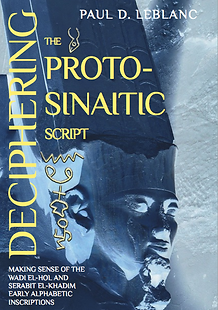

Books
Egypt, Judaism, and the history of the alphabet intersect in
Deciphering The Proto-Sinaitic Script
From its initial appearance, in around the 18th century BC, the origins of proto–Sinaitic writing can be traced back to Egypt’s Middle Kingdom period, when it was somehow derived from the hieroglyphs, its parent–system. The importance of proto–Sinaitic lies in the fact that it represents the alphabet’s earliest developmental period—a kind of ‘missing link’ between the hieroglyphs and these early Semitic alphabets from which our own Latin one descends, by way of the Phoenician and Greek. However, up until now, proto-Sinaitic has remained for the most part undeciphered. The intriguing possibility of giving voice to a lost culture or civilization from thousands of years ago is tantalizing. Representing one of the most enticing problems in modern archaeology, the enigmatic allure surrounding ancient languages and the undeciphered scripts in which they are encoded is truly vexing. In his bold and original research, LeBlanc argues convincingly to have solved the mystery and uncovers some incredibly enthralling information about the people who invented it: The epigraphic evidence suggests that the Egyptianized Canaanites who first devised the proto–Sinaitic script were surprisingly instrumental in the formation of early Israelite culture and proto–Judaism.
